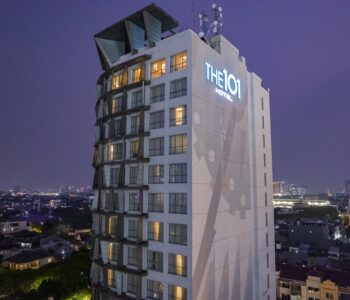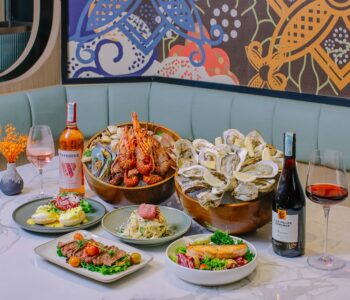
In 2018, bulk stores began to mushroom across the city, many established by young, hopeful entrepreneurs. With a growing awareness of plastic pollution, and a collective mission to reduce single-use plastic products (grocery bags, straws, sachets, product packaging), bulk stores seemed to be the perfect business trend, set to ride the swell of this new eco-wave. But, upon researching to update our listings, NOW! Jakarta found many had struggled keep afloat and closed down. So, instead, we set to investigate these ‘bulk closures’ and speak to the remaining survivors to find out — what happened?
With their wholesome, rustic shops — many of which smelled of a mixture of spices, aromatherapy, herbs and, well a lot of wood — Jakarta’s bulk stores enjoyed a keen following of environmentally-conscious citizens, from new and young converts following the trend to middle-class mums vying to make a difference. Jars of flour, rice, pasta, seeds, powders and more invited patrons to fill up their paper bags with their everyday needs, replacing the plastic-heavy, mass-produced consumer goods sold at supermarkets. Sold according to weight, volume or quantity, every customer bought how much they needed and a lot of the time were supporting local SMEs as well.
Then, the pandemic happened, and the bulk stores seemed to be the complete opposite of what people were after: packaged, sealed, disinfected, with minimum human contact. Not quite what they were selling. So, many understandably closed up shop — but many also never reopened again. Was the trend over? Have the environmentally-conscious citizens just up-stick and disappear? Two of the surviving companies share a little on the challenges and shed light on why so few remain.
Saruga Indonesia

This package-free store opened in November 2018, and has since held true to their vision and mission, i.e. ‘To encourage and improve the society to be better for the environment’. A noble cause. The store is considered the first bulk store in Jakarta by many, and takes it names from the Dayak word for heaven, often symbolising going ‘back to nature’.
Desiree Irawati, the Co-founder, shared quite frankly that keeping Saruga Indonesia going was incredibly challenging. Only through the almost stubborn idealism and commitment of her and co-founder, Ridha Zaki, have they pushed through — and their loyal repeating customers, whom they highly appreciate.
“Those who closed were actually much bigger than Saruga. But we don’t put the profit as number one because we really want to convey to the public that we have to do something, to change people’s habits, and we don’t want to disappoint those [loyal customers] who have tried to come to our store. Zaki and I really considered our customers and re-learnt how to actually run bulk stores and we are still optimistic about Saruga,” Desiree said with conviction.
Desiree understands the difficulty of running bulk stores because zero-waste shopping hasn’t quite reach ‘everyday lifestyle’ in Indonesia, it’s just a trend, a fad. She saw this clearly with her own customers at Saruga, and through the quantity of products she’s able to sell.

“Yes, it’s a trend. If it was a lifestyle, there would be regular demand. At the beginning of the year we opened, we had more than 300 products, now we only sell 50-100 products. For example, we used to have various types of sugar, now we only sell one type of sugar. Even then, only our loyal customers buy it. The same goes for the number of MSMEs that we work with. We used to partner with more than 60 MSMEs, but now we only collaborate with 30. This is also one of the reasons we still survive, even though the transactions are not too many, we still help our MSME friends because many have also fallen due to the pandemic. It is also sad when there is a demand for their products, but they’re no longer producing.” Desiree continued.
In addition to having formed a strong community, thanks to its program Saruga Community Service; they must actively create other projects. The store brings the positive result when a big brand retailer, PT Unilever Indonesia, agreed to collaborate and follow its business model and created a large community. The collaboration, not only selling primary necessities products from the well-known brand but also resulted in an exclusive project: refill station for liquid products to provide alternatives to consumers to be wiser in using plastic as part of its Saruga Solution.
“Saruga Indonesia is purely a bulk store, but to maintain this, we made other projects, one of which is a refill station including a pump machine for refilling liquid products such as shampoo, soap etc and dispensing machines. In clinical trials, this machine is safe from micro bacteria. Companies can rent our machine. We are open to every possibility and opportunity out there related to environmental issues. Moreover, the Indonesian Food and Drug Authority (BPOM) has issued a law that now allows cosmetic refills. So, Saruga Indonesia, the only bulk store that makes this dispensing machine, can partner with companies in providing this machine.”
Alami Bulkshop

Alami Bulkshop was founded by Efi Femiliyah in October 2019, who almost admits that running the store is a real challenge. The shop was established to support Efi and her family who had been living a zero-waste lifestyle since 2015. Prior to opening Alami Bulkshop, Efi had been educating the general public about zero-waste living as well as communities she was a part of, such as organic communities and sustainable living activists. This is no trend for Efi, this is a way of life.
“Alami Bulkshop was built on family ideals, not merely business. We can see now that if it is founded on idealism, it would survive, but if it was purely for profit, it would not have survived. Our shop is also open at home, there is no rental fee, which is also why we’ve been able to survive. But it goes back to the intention that to educate the public we have to be as close to them as possible. And, we take the products directly from the producers, so if you want to compare prices, we are much cheaper. I also brand myself as an urban farmer because I grow my own produce so our store is rich in local fruits such as papaya and mini avocado,” said Efi.
Efi also said that shopping at bulk stores can actually save money because we only buy what we need. But the challenge is to increase customers and it is still difficult to convince people to sacrifice ‘ease’ and ‘convenience’ to reduce their waste.
“Before the pandemic, our store was doing really well. During the pandemic, we had a bit of trouble figuring out online sales. Because offline, people come directly and bring their containers. Online, we have to provide special packaging that we have to think about so that we don’t produce a lot of waste, so we use paper packaging and create a container exchange programme.” Efi explained.
Efi also said that many of her customers are well-educated and well-to-do; converting the average Jakartan has been difficult. Showcasing Indonesian products has certainly helped turn the tide, promoting buying ‘local’. However, unlike her friends at Saruga Indonesia, Efi refuses to work with big consumer goods companies like Unilever.
“I choose not to work with big brands because to me they are two-faced. Instead, they use the bulk store as a gimmick. I sell products that I and my family use and I want to promote products from SMEs.” Efi firmly said.
Clearly, each bulk stores must find their way own way to survive. Either way, they are all waiting for that watershed moment where citizens embrace zero-waste (or even just less waste!) lifestyles fully. What would turn the tide? Would more stores encourage more customers and normalise the practice? Perhaps, but for now, Saruga and Alami continue their fight.
Saruga Indonesia
Jalan Taman Bintaro No. 1 Sector 1
+62 812 8036 5566 | @sarugaindonesia
sarugaindonesia.com
Alami Bulkshop
Jalan Srengseng Sawah No. 54, Jagakarsa
+62 819 1103 5958
@alami.bulkshop







